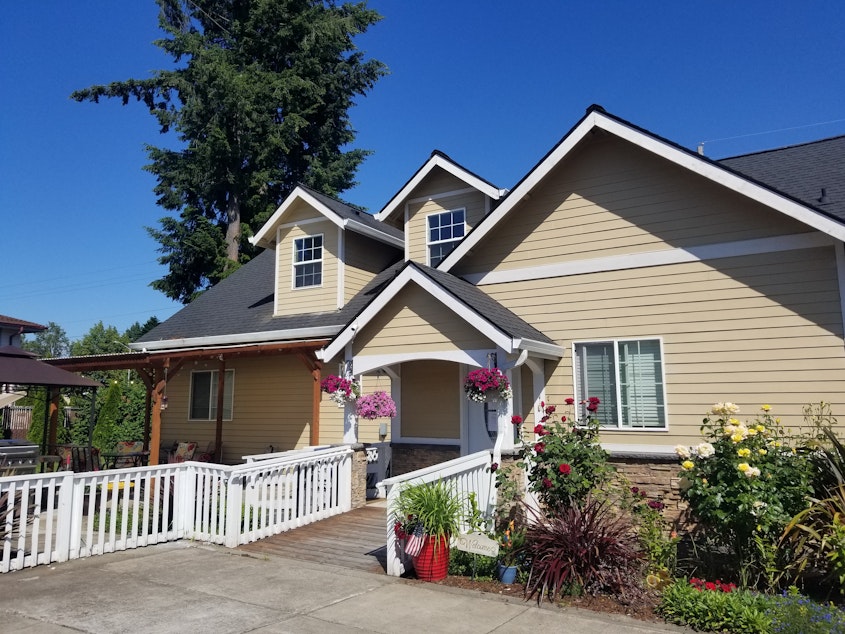WA adult family homes fear being forgotten during pandemic

Imagine caring for three sick, elderly people on your own for a month. While having Covid-19 yourself.
Lilia Magda of Vancouver, Wash. runs an adult family home, one of the small operations that house thousands of people statewide.
“I literally took it one hour at a time," she said.
Health officials are trying to get a handle on the coronavirus in these settings. More than 60% of the coronavirus deaths in Washington state are linked to long-term care facilities for seniors. Those facilities run the gamut from large nursing homes, such as LifeCare in Kirkland, to small adult family homes, where caregivers live in close contact with up to six residents.
Magda has operated her adult family home in Vancouver for 10 years. She made changes as soon as the outbreak started.
“The moment I heard about those cases I immediately stopped activities from outside the home," she said, including their art therapy classes.

Sponsored
Magda's staff are full-time, they don’t work in multiple facilities. Even so, she said hers was the first adult family home in Washington state with a confirmed case of Covid-19.
“We didn’t even know we had a case,” she said. “The symptoms were not the classic cough and fever.”
A resident went to the hospital with what appeared to be a urinary tract infection. But later passed away. It took 10 days to learn they tested positive for Covid-19.
“We had to be quarantined because there was an outbreak. And I was exposed to all of them; I was the only caregiver,” Magda said.
She sent her staff home and cared for the three remaining residents herself from mid-March to mid-April. All of them had the virus.
Sponsored
“I did my very best to not show my stress, my anxiety, my fear. I was terrified,” she said.
People delivered groceries to their doorstep. Magda said she was only able to sleep 3-4 hours each night. But all three residents recuperated while at home. And Magda herself had mild symptoms. She said the difficulties were mental, more than physical.
“I still have nightmares,” she said. “I wake up night and go check their temperatures. To say I checked it every 20 minutes, it’s an understatement.”
These days she can bring a sense of humor to the ordeal.
“I drank lots of coffee,” she said.
Sponsored
People live in close proximity in these homes, sometimes sharing bedrooms and bathrooms. Magda believes it’s possible to prevent Covid transmission in these settings, as long as there’s adequate personal protective equipment and rapid testing.
“What I’m going to take from this, first of all, is ‘be more prepared,’” she said.
Ingrid Ulrey oversees long-term care facilities for Public Health Seattle-King County. She said she welcomed Governor Inslee’s order last week for Covid-19 testing of all residents and staff in nursing homes and memory care units. Ulrey expects it to eventually include all long-term care facilities.
“Because we’ve seen huge outbreaks of Covid 19 nationwide in nursing homes, we are very concerned about a similar level of risk for people living in adult family homes,” Ulrey said.
Ulrey said King County is recommending that state agencies create a framework to test people like Magda and her residents, maybe through existing visits by home health nurses.
Sponsored
“One of the biggest barriers and challenges to testing in adult family homes is that they don’t have the medical oversight,” Ulrey said. “So there isn’t a responsible party for residents to do a physician’s order for the test, or to orchestrate the testing, or to report back the test results.”
Paramedics with the Seattle Fire Department are testing staff and residents in 60 homes, as part of a pilot project, with results due this month. But there are 3200 homes statewide, and they’re very decentralized.

As of May 2, the Department of Social and Health Services said 51 homes had reported Covid-19 cases. By June 1, the number of homes reporting cases stands at 73. John Ficker is the executive director of the Adult Family Home Council of Washington State. He said, “I often say to communicate a message to all of the adult family homes in the state of Washington, I need three months.”
Ficker said his group sometimes feels like an afterthought – in March as Governor Jay Inslee announced restrictions on visitors and access, some officials seemed unclear on whether adult family homes were indeed long-term care facilities.
Sponsored
“I was like, ‘YES,’” Ficker said. “So when we start worrying about things like PPE distribution, and testing, I was really concerned about just kind of falling out of the framework that was being designed out there, about how we’re going to respond to this pandemic.”
Big picture, Ficker said he just wants to make sure these small facilities and their residents aren’t forgotten as the pandemic evolves.




